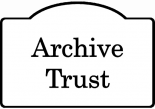The Archive Trust is a small charity with big dreams. We hope to curate an online archive of physics, philosophy and mathematics. We are currently a long way away from realising our ambition, but we have a plan. Here are the key obstacles in front of us.
Digitisation
Our collection contains thousands of physical assets. Among these are cassette tapes, minidiscs, DVDs, CDs and floppy discs. There are even older media formats too!
We want to turn these analogue formats into digital ones. This will permit us to post our recordings online! One problem is that our assets are old and fragile. The very act of digitisation could damage them if not performed correctly. So, we need to give them expert care and attention. This is not cheap.
Transcription
Every recording comes with metadata: information about the recording. This could be general (like title, duration or subject) or technical (like framerate or physical dimensions of the asset).
Modern (digital) formats automatically package the metadata together with the recording. For older (analogue) formats, this is written on the label or the case of the asset. When we digitise each recording, we must also digitise the metadata.We then have to reunite each recording with its metadata. We want to do this for every single asset.
How do you extract and digitise the information on the label of a cassette tape? Our current resources limit us to a very low-tech approach. We read each label individually and then type up the appropriate information. This is very time-consuming (and boring!), but it’s the only method available to us right now.
Accessibility
We don’t just want digital versions of all our recordings. We want them to be available online, and to be easy to search.
This means we must first create an organised catalogue or database of our recordings.
We then need a website that lets you access the database. The website should be exciting, appealing and intuitive.
Quality
We must perform the digitisation, transcription, preservation and presentation to certain archival standards. That means taking the time to do these correctly. It also means employing experts and professionals to perform certain complex tasks.
